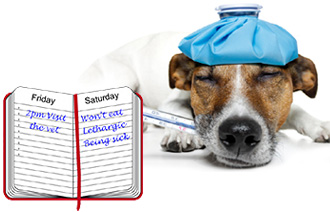Reporting Adverse Reactions
 If your dog has an adverse reaction to medications, vaccinations or microchips, did you know you can report it?
If your dog has an adverse reaction to medications, vaccinations or microchips, did you know you can report it?
Did you know that reporting it is actually quick and easy and can be done online?
It is important that we all report any adverse reactions, so there will be a record should it happen again to another pet.
If adverse reactions are not reported and your dog is unwell after being given a certain drug or vaccination, there will be no record of other dogs also being ill from the same medication. The drug will continue to be deemed safe and the record will show “no reports of reactions”.
But does that mean there are no reactions to the drug? No, it simply means no reactions have been reported.
Reading an article by Richard Allport in Dogs Today magazine, he mentioned SARSS (Suspected Adverse Reaction Surveillance Scheme). SARSS gathers information on suspected adverse reactions to veterinary medicines (in animals and humans).
I consider myself pretty genned up on many things dog, but had never heard of this. I assumed the vet would have some kind of legal obligation to report adverse reactions to the relevant body. Actually I think they do but does it always happen? This is something we all need to be doing.
Report a suspected adverse reaction
The Veterinary Medicines Directorate (VMD) deals with the safety, quality and efficacy of veterinary medicines in the UK. You can quickly and easily report a suspected adverse reaction online via the VMD Defra website. The site collects information from veterinary professionals and the general public on suspected adverse reactions to veterinary medicines.
Note the use of the term “suspected”. Richard Allport points out that “there is no need for proof that the reaction was caused by the product – just a suspicion or likelihood. In other words, each and every episode of any kind of illness or unwellness following the administration of a veterinary medicine should be reported.”
To report an ANIMAL adverse reaction or lack of efficacy to a veterinary medicinal product or to a human product - click here
To report a HUMAN adverse reaction to a veterinary medicinal product - click here
From April 2014 the VMD also started monitoring reports of adverse events following microchipping of companion animals.
To report an adverse event following microchipping - click here
When you fill in the report you will need to provide basic information about:
- The name of the product which you think caused the adverse reaction or lack of efficacy.
- The animal(s) or person(s) in which the adverse reaction or lack of efficacy occurred.
- The signs observed of the adverse reaction or lack of efficacy that is suspected.
- Your contact details as the reporter of the adverse reaction or lack of efficacy.
We all have a responsibility
I wonder how many vets are actually doing all this reporting of reactions via the SARSS form? Could adverse reactions to veterinary drugs, medicines and vaccinations be under-reported? Yes, most likely. So now you know you can report reactions yourself.
The information that you provide can help to improve the safe and effective use of veterinary medicines.
So get sharing and get reporting!
By Jenny Prevel
© D for Dog www.dfordog.co.uk
This article belongs strictly to D for Dog and we do not authorise the copying of all or any part of it.

Great article. Have shared
A great find - like the author I'm pretty well informed about all things doggy, but it's great to know we can report these things ourselves!
I had my 6 boxer puppies injections one was taken very ill having to go to the vets and was kept in over night on a drip this was very worrying plus the vets charged us over £300 the pup still as a large lump were the injection was done can I claim for this and will the pup be ok after his problem
Hi how do I check that my vet has reported an adverse reaction?